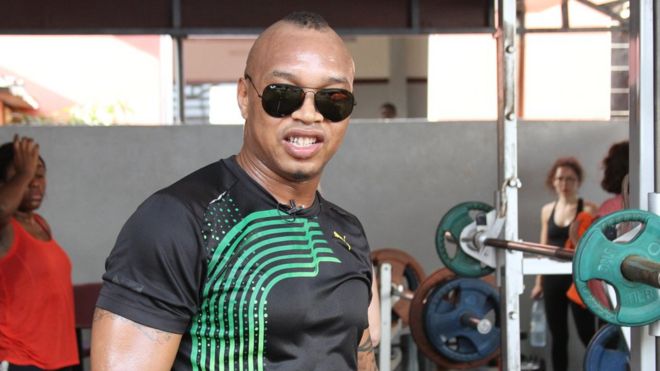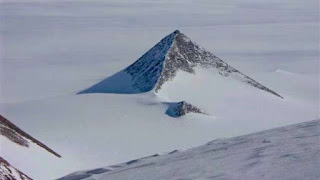El Hadji Diouf: I am not a bad guy, says controversial Senegal great

El Hadji Diouf is a hero in Senegal. Everywhere he goes, he is mobbed by fans both young and old. His countrymen are still grateful for the stellar role he played during the 2002 World Cup in Japan and South Korea.
But in England, he is remembered more for his controversial antics than for his football talent.
It is a trait that followed him in the English league clubs he played for - from Liverpool and Blackburn Rovers to Bolton Wanderers, with a spell for Rangers in Scotland as well.
Diouf was aggressive, spat at opponents and confronted match officials as well as opponents.
But now in his retirement, he is telling his story.
'I am a bad loser'
"I am a lion, I am a bad loser and it's not wrong to be a bad loser," said Diouf of his often combative mood during his playing days.
"I have got character and I want people to respect me."
Diouf, who has moved back to the Senegalese capital Dakar, says he was often misunderstood during his playing days in England.
He said: "I am an easy target. It's easy to talk about El Hadji Diouf and I let them talk but I know in my heart I am a good guy. My family know, my population knows, my continent knows I am a good guy and that's the best thing. The rest is not my problem."
Despite this defence, Diouf admits he has done some bad things.
When asked why, for example, he used to spit at opponents, he said: "Maybe they used to tell me something I didn't want to hear. I did that, I paid and now it's finished."
'Gerrard never did anything for his country'
The Senegalese legend had a drawn-out row with former Liverpool team-mates such as Jamie Carragher and Steven Gerrard.
Even today, Diouf and Gerrard continue their feud through the media. So what exactly is the problem?
"I have no problem with him," Diouf said. "He [Gerrard] is a strong character and I am a strong character.
"'Stevie G' was a very good player. People like him in Liverpool but he never did anything for his country. I am Mr El Hadji Diouf, Mr Senegal but he is Mr Liverpool and Senegal is bigger than Liverpool and he has to know that."
Diouf is working in Senegal as a government goodwill ambassador. He is President Macky Sall's adviser on sport as well as running his own sports newspaper business in Dakar - and is often mobbed by young people when he visits his gym in the city.
"My life is about sport but the government cannot do everything alone, they need help from people like me," Diouf said.
"The president believes in me and that's why when I finished playing football, he called me and told me he wants me to help because the young generation believe in me. I am an example to them."
Asked if he would consider a role in politics, Diouf said he was concentrating on helping to develop his country - but could not rule out entering politics in future.
He said: "I am interested because we have to make things change. People like me can make things change.
"We have a country to build, a continent to build and why not be involved in politics tomorrow?"
'We put Senegal on the world map'
Twice presented with the African Footballer of the Year award by the Confederation of African football (Caf), Diouf was part of the Senegal side which reached the last eight at the 2002 World Cup, beating defending champions France along the way.
He describes that period as the greatest achievement of his career - putting it on a par with Diego Maradona's World Cup-winning achievements with Argentina.
"We put Senegal on the world map," he said. "Before the World Cup nobody knew Senegal, but after the World Cup everybody wanted to know where Senegal was.
"What Maradona did for his country is what I did for Senegal. I was one of the biggest men at the 2002 World Cup.
"We were colonised by France. Most of the businesses are run by French people here and to beat them was a big thing for us.
"Before the game, they used to say, 'The reserve team is going to play against the first team' - because most of the players used to play in the French league.
"I used to be at Lens, Salif Diao [was at Sedan], Khalilou Fadiga [was at Auxerre], most of the players played in the French league but we used to say: 'Be careful before you kill the lion.'"
Diouf says he would like to do more to help develop football on the African continent, but feels structural changes need to take place.
"Fifa has changed and now it's time for African football federations to change too," he said.
This is the first in this week's Where Are They Now? series by Stanley Kwenda, looking at what some of Africa's ex-football stars are doing after hanging up their boots. He will also speak to Salif Diao, Peter Ndlovu, Benni McCarthy and Nwankwo Kanu.
He said: "I am interested because we have to make things change. People like me can make things change.
"We have a country to build, a continent to build and why not be involved in politics tomorrow?"
'We put Senegal on the world map'
Twice presented with the African Footballer of the Year award by the Confederation of African football (Caf), Diouf was part of the Senegal side which reached the last eight at the 2002 World Cup, beating defending champions France along the way.
He describes that period as the greatest achievement of his career - putting it on a par with Diego Maradona's World Cup-winning achievements with Argentina.
"We put Senegal on the world map," he said. "Before the World Cup nobody knew Senegal, but after the World Cup everybody wanted to know where Senegal was.
"What Maradona did for his country is what I did for Senegal. I was one of the biggest men at the 2002 World Cup.
"We were colonised by France. Most of the businesses are run by French people here and to beat them was a big thing for us.
"Before the game, they used to say, 'The reserve team is going to play against the first team' - because most of the players used to play in the French league.
"I used to be at Lens, Salif Diao [was at Sedan], Khalilou Fadiga [was at Auxerre], most of the players played in the French league but we used to say: 'Be careful before you kill the lion.'"
Diouf says he would like to do more to help develop football on the African continent, but feels structural changes need to take place.
"Fifa has changed and now it's time for African football federations to change too," he said.
This is the first in this week's Where Are They Now? series by Stanley Kwenda, looking at what some of Africa's ex-football stars are doing after hanging up their boots. He will also speak to Salif Diao, Peter Ndlovu, Benni McCarthy and Nwankwo Kanu.
BBC


Commentaires